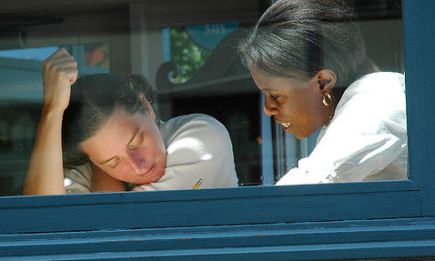The right glasses to look with

Last week, a seminar in Cambridge on enhancing the development of the teaching profession was organized. The timing of this seminar was no accident; it was planned just before the International Summit on the Teaching Profession in Amsterdam. ScienceGuide student of 2011, Simon Verwer joined this two day seminar at Cambridge University. At this seminar, Verwer participated in the discussion on daily teaching practices, and reported his personal highlights of the seminar to ScienceGuide.
Controlled autonomy
Every country has its own educational system, all different in their outcomes and successes. Twenty countries are brought together to learn from each other successes and struggles. And to discuss what are the ingredients of an excellent educational system and what role professional development can play in achieving an excellent system.
The professional autonomy of teachers is getting more status in teacher policy, but how can the quality of teachers be measured in this new system? More autonomy for teachers should not result in a new control system that will, in return, limit a teacher’s autonomy. The trend of measuring and testing more, might not be the solution, most participants think.
Another clear trend in teacher policy is, like one of the speakers stated, that “teachers are no longer object, they have become subject”. Policy on the teaching profession is more and more shifting from strict structures to ‘human agency’. The opinion of teachers has become more central in most countries. This shift will also be one of the central themes of the International Summit on the Teaching Profession in Amsterdam.
Other themes that have been discussed will be central at the ISTP 2013 as well. “What is teacher quality? How can this be formulated objectively? What system stimulates mutual learning between teachers most effectively? And finally, how do you reward excellent teachers?”
The Summit in Amsterdam is a unique opportunity to discuss these themes on an international level. “A lot can be learned from other countries. These seminars are like a trip around the world. One minute you are discussing the situation in Finland and the next the focuses completely shifted to Singapore”. Although inspiring, this internationally oriented macro-vision has some also some disadvantages as well. “It can be dissatisfying at times as well. The examples from different participating countries can at times, feel like a random collection of experiences of the participants, but at the same time it is exciting”.
Teacher self-efficacy
‘Teacher self-efficacy’ is the most popular term of the seminar in Cambridge. Most of the speakers use it to express that teachers need, above all, time and autonomy. If these fundaments of the teaching profession are secured, others will follow in its slipstream.
Another important lesson that was learned during a panel discussion with teachers from Ghana, Bosnia, England and the Netherlands was to keep things simple stimulates enthusiasm. The concept of ‘you don’t have to be ill to get better’ can be leading in a school’s teacher policy.
Verwer: “A new insight I had was that teacher quality is not an individual construct, but a collective goal formulated by a group of teachers. Especially countries with high-ranking PISA results have many mechanisms to connect both teachers and schools”.
The seminar concluded with a preview of the Summit in Amsterdam. “The Summit in Amsterdam will be a unique opportunity to discuss the teaching profession with unmatched expertise from all around the globe.” Dirk van Damme from the OECD compared it to the economic crisis: “We already had all the data, but we didn’t have the right glasses to look with.” The Summit in Amsterdam might offer even better glasses.
Meest Gelezen
Vrouwen houden universiteit draaiende, maar krijgen daarvoor geen waardering
Hbo-docent wil wel rolmodel zijn, maar niet eigen moreel kompas opdringen
Wederom intimidatie van journalisten door universiteit, nu in Delft
‘Waarom het nu niet lukt om medezeggenschap in hbo te versterken’
‘Sluijsmans et al. slaan de plank volledig mis’
